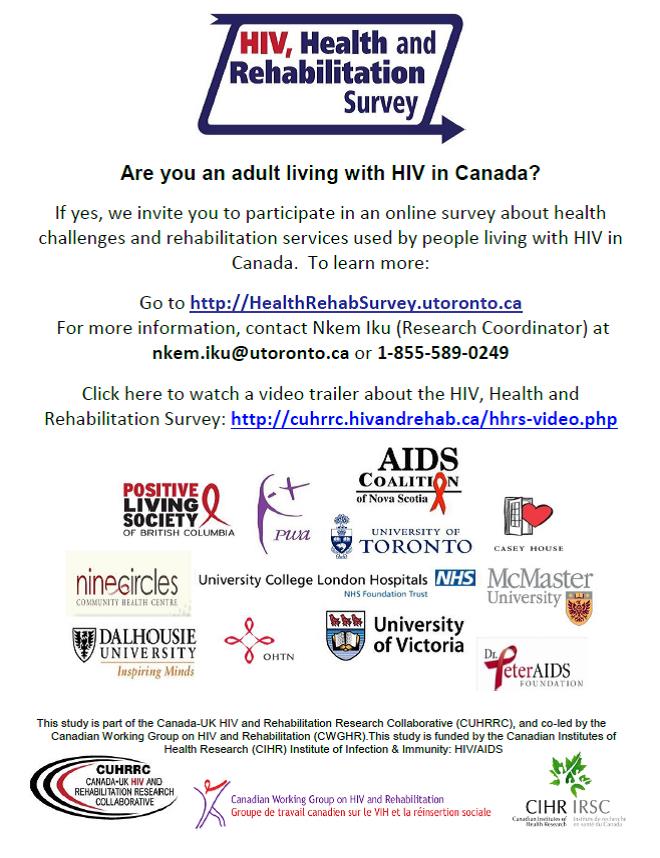PAN member organizations are being invited to assist in recruiting participants for a Canadian study that seeks to understand the range of services that people living with HIV/AIDS (PHAs) are using when facing health challenges due to HIV. Knowing the range of health conditions that PHAs are living with, the types of health challenges they experience, and how they deal with them can help PHAs, AIDS service organizations, health care providers, and community leaders get a better understanding of how to meet the needs of people living with HIV/AIDS.
What is the HIV, Health & Rehabilitation Survey?
The HIV, Health and Rehabilitation Survey (HHRS) is a self‐administered online survey comprised of questionnaires such as the HIV Disability Questionnaire (HDQ), social support, coping, stigma and living strategy scales, demographic questionnaire (personal attributes including comorbidities, age, gender), and a questionnaire exploring rehabilitation and community‐based organization services use from the perspective of PHAs. Our goal is to administer the survey links to 3500 PHAs across Canada in order to obtain 1600 complete survey responses.
Who is Eligible to Participate?
Any adults (18 years or older) living with HIV across Canada who are able to read and understand English and also have a working email address can take part in the HIV, Health and Rehabilitation Survey. It does not matter whether someone has accessed rehabilitation services – we want to hear from a broad range of PHAs to learn about their health challenges and strategies in which they deal with them.
What is involved in Participating in the HIV Health and Rehabilitation Survey?
Participating in this study involves completing the survey questionnaire, which will take about 30‐40 minutes to complete. We recommend that participants block off a period of 30‐40 minutes that they can sit comfortably and uninterrupted to complete the entire survey. After completing the survey, participants will have the opportunity to receive a $25.00 gift card as a token of appreciation for participating in this study.
What is the potential role of my organization in the HIV Health and Rehabilitation Survey?
Community‐based partnerships have been integral in the development and piloting of the HIV, Health and Rehabilitation Survey and we believe resulted in a more robust, feasible and relevant survey and will lead to more relevant interpretation of findings. As a member of a Recruitment Network in the HIV, Health and Rehabilitation Survey Study, your organization would be asked to circulate information about the survey using a variety of mechanisms that may include any of the following:
Normal
0
false
false
false
EN-US
X-NONE
X-NONE
MicrosoftInternetExplorer4
/* Style Definitions */
table.MsoNormalTable
{mso-style-name:”Table Normal”;
mso-tstyle-rowband-size:0;
mso-tstyle-colband-size:0;
mso-style-noshow:yes;
mso-style-priority:99;
mso-style-parent:””;
mso-padding-alt:0in 5.4pt 0in 5.4pt;
mso-para-margin:0in;
mso-para-margin-bottom:.0001pt;
mso-pagination:widow-orphan;
font-size:10.0pt;
font-family:”Times New Roman”,”serif”;}
- Circulating an e‐blast about the survey from your client mailing list
- Posting an electronic notification about the HHRS on your organization website
- Some organizations have also chosen to post notices about the survey on Twitter or Facebook
- Displaying recruitment posters, flyers or recruitment cards with the survey link on site at your organization or clinic (contact Research Coordinator, Nkem Iku [email protected] if you would like these materials)
- Spreading the work about the study via word of mouth
If possible, organizations involved and with the capacity may choose to assist individuals interested in the study providing access to a computer and if needed support to complete the survey questionnaire.
Who is conducting the HIV Health and Rehabilitation Survey?
This research study is being conducted by a team of researchers, clinicians, PHAs, and community‐based organizations in regions across Canada including British Columbia (Dr. Peter Centre AIDS Foundation; Positive Living Society of British Columbia, University of Victoria), the Prairies (Nine Circles Community Health Centre), Ontario (McMaster University; Ontario HIV Treatment Network; University of Toronto; Casey House; Toronto People with AIDS Foundation), the Atlantic Region (Dalhousie University; AIDS Coalition of Nova Scotia; AIDS Committee of Newfoundland & Labrador), and London, the United Kingdom (Barts and the London NHS Trust). This study is co‐led by the Canadian Working Group on HIV and Rehabilitation (CWGHR).
How will my organization benefit from this study?
This study will yield the first Canadian profile of disability and rehabilitation from the perspectives of PHAs. It is critical to determine the types and severity of disability that PHAs in Canada face, assess the impact of contextual factors such as age and comorbidities on the disability experience, and help to identify the types of interventions and strategies used by PHAs to reduce disability. We hope to be able to report results specific to region so that organizations may obtain a sense of the types of health related challenges, comorbidities and rehabilitation services use among PHAs in their area. Results can be used by PHAs, health providers, community organizations, and policy‐makers to promote timely and appropriate access to interventions and services that may reduce disability and enhance the overall care and treatment of PHAs in Canada. The researches have committed to sharing results of this study through the knowledge exchange channels of the Pacific AIDS Network.
Where do I go for more information?
Read additional details in the Recruitment Network Overview document. For more information about the study contact Nkem Iku (Research Coordinator) by email at [email protected] or by phone 416‐946‐3935 or 1‐855‐589‐0249 or Kelly O’Brien (Principal Investigator) at [email protected] or 416‐978‐0565.
